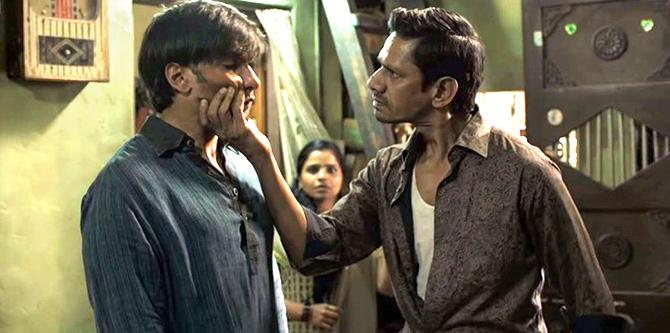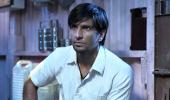'If Murad's Mozziness doesn't strike us in the eye, if we see the film as a youth's struggle to break free of the shackles holding him back and not as a Muslim fighting the system, it is because not once in the film does Zoya show him blaming his religion for his low social status or struggle, a temptation many 'progressive' film-makers may have yielded to for it sounds so politically correct,' says Saisuresh Sivaswamy.

Have you seen the latest hit movie about a Muslim youth from a ghetto struggling to break free, his own family among those trying to keep him down, and how he fights back at the constant taunts and abuses thrown at him ever since he decides to aspire for a better life?
No?
But have you seen Gully Boy?
Yes? Just as I thought.
Now what if I told you that my earlier description was in fact about Zoya Akthar's cult film that is both a critical and box-office success?
Gully Boy is very much a film for our times, a time when old social structures and hierarchies are fast collapsing around us, with the disruptive power of the Internet swinging the wrecking ball on the old order by redrawing rules, careers, professions, relationships, what-have-you.
By the way, in case you missed it, the film is also a social commentary on the changing Muslim dynamic, something mainstream Bollywood and its indie offshoots cannot tackle without bringing in the terrorism factor (from My Name is Khan to Aamir to Mulk) or the unapologetic crime element (like in Raees).
In fact, so used to are we to seeing Bollywood's Muslim protagonists through the prism of their religion, and the resultant 'problems' only they face, that when a Muslim on screen does the normal things the rest of us do, it leads to a startled 'Oh, so they are also people like us!' reaction.
The fact is, while we have allowed ourselves to be blinkered by mass media's portrayal of how an entire community is supposed to look, talk and behave, the Muslim is changing.
The collapse of the formal structures that held up the old world, which I mentioned earlier, has had a liberating effect on the community, and we all have any number of examples of that in our various touchpoints with the new world out there.
How many times have you booked a meal on Swiggy or Zomato, or a cab on Uber and Ola? And how many times have you been served by someone from the Muslim community? My own experience is, invariably so. Sure, this is no scientific evidence of the reality around us, but it serves as a dipstick to a changing society.
So what if in the old economy there were checkpoints -- based on caste, language, region, religion -- that filtered out candidates. The new economy has served as a great leveller, one where the mobile phone is the Open Sesame to Aladdin's cave.
But as the old world hasn't fully thrown in the towel, the transition from one era to another as always is fraught with pain, and the resultant clash between values old and new.
Like Gully Boy Murad faces the pressures to 'conform' every step of the way, not step out of line, do only what is expected of him, including from his own family. A driver's beta can only be a driver; you are of low status, so let it reflect in your gait; the biggest thing to aim for is an 'office job', never mind it is a lowly one, brainless or that you are just not interested in it. In the old world you shut up and put up with it.
Where Bollywood doesn't look at the Muslim through the T prism, or portray Muslims as the stereotype demands, the character is merely given a Muslim name, beyond which there is nothing 'Muslim' about him or her.
But not Zoya. 'Murad' for her was not a mere place-holder, one that could be substituted by a Suresh or John or Kirpal or Boman. Murad is very much a 'Mozz', as we say in Mumbai, he is shown doing the wazu in the masjid ahead of the namaaz, his father brings home a 2nd wife when the first wife is around, thanks to his music he jams with the hip set but doesn't touch the booze. And in the ghetto that is Dharavi, he lives in the Muslim ghetto. Naturally, his interactions are largely with Muslims, and his girlfriend is one. It is all as real as it can get.
If despite all this Murad's Mozziness doesn't strike us in the eye, if we see the film as a youth's struggle to break free of the shackles holding him back and not as a Muslim fighting the system, it is because not once in the film does Zoya show him blaming his religion for his low social status or struggle, a temptation many 'progressive' film-makers may have yielded to for it sounds so politically correct.
Take religion out of otherisation, and you will be surprised how widely shared the experiences become.
The Sachar Commission may have ranked Muslims along with scheduled castes and scheduled tribes in terms of economic status but, really, poverty knows no religion, does it?
But so conditioned are we to seeing Muslims getting the rough end of the stick -- it is not that they don't, but so does everyone else in our system -- in our films only for belonging to the faith they do, that even when Murad has those little run-ins with his friend who skates on the wrong side of the law, one wonders at the back of one's mind if they will get picked up by the police and subject to some 3rd degree that will invariably turn them into, well, an Adil Ahmad Dar.
And when finally the long arm of the law does intervene, Zoya's brilliant handling of the situation leaves you gobsmacked. Now here was a situation tailor-made to stoke the jwala that is seething within Murad, and any other director would have capitalised on it to give an extra edge to Murad's angst and weltschmerz. But not Zoya.
Because Murad has enough burden to carry without piling on the M factor to him. That would have not only derailed his story but also gone into a zone that the most talented woman director of our time doesn't wish to enter, at least not yet.
It is very easy to say that Gully Boy occupies a world that is far removed from that of the protagonists of Zoya's previous films. Be it the rocking Zindagi Na Milegi Dobara or the zippy Dil Dhadakne Do, they are usually set among the upper crust for who Dharavi could well be in Durban.
It is tempting to draw the conclusion that the poverty and grime of Gully Boy are not familiar territory for the director, but that would be only partly correct.
Be it the exotic locales of her films or the underbelly of Mumbai as shown in her latest film, the background is not the story that Zoya Akhtar wants to narrate.
Her forte is the characters she creates and the interaction among them that she engenders. If you thought Zindagi... was about Spain, Tomatina, Running of the Bulls and beautiful people, then you've totally missed the story of the characters Zoya was narrating. Ditto with Dil Dhadakne Do.
And she does again it with elan in Gully Boy whose characters so get you that you completely missed that its main characters were all Muslims.










